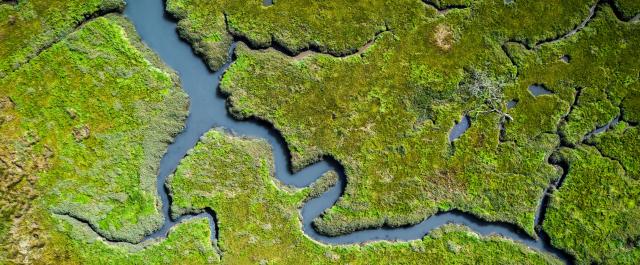“To forget how to dig the earth and to tend the soil is to forget ourselves.”
- Mahatma Gandhi
In the industrial era, the layout and development of the landscape was primarily determined by agricultural developments and needs. Society was largely focused on its basic need for food supply. The use of water in this respect was a natural given. Knowledge of the local water system was essential, as well as knowledge of the soil, natural vegetation, etc.
In the industrial era, the agricultural sector became less and less dominant. The sector benefited from industrial developments, machine-based working methods, the introduction of new methods of fertilisation, and chemical control of pests, diseases and weeds allowed the agricultural sector to produce at larger scale.
After the Second World War, the emphasis in the sector shifted even further towards large-scale and efficient production. “No more hunger” was the adage. This was definitely the case in the western world. However, when the original goal of “no more hunger” had been achieved, we continued down the same path. Larger scale, more efficiency, etc. has continued up to the present day. The focus has shifted from “no more hunger” to economic profitability.
Unfortunately, this development has gone hand in glove with a number of undesirable side-effects. Pollution and overloading of water and soil systems, reduction of biodiversity, less healthy products, etc. are just some examples.
Besides these negative consequences, the profitability of the sector has also come under pressure. Products are produced locally or regionally by a large group of agricultural operators, but for a global market with players who have enormous market power. As a result, the prices of products are under pressure. At the same time, climate policy and animal welfare are putting more and more regulatory pressure on the agricultural sector.
A new role for the agricultural sector?
Within the frameworks mentioned above, farmers are also stuck with a rather one-sided focus on food and crop production, prioritising yield rather than, for example, water buffering or energy production.
Nonetheless, farmers are in an excellent position to know the capacities of their soil, and to use that soil much more flexibly according to needs and climatic changes. The farmer could become a central pivotal figure in a resilient deployment of land and soil in light of the various sustainability challenges facing us. Luc Lavrijsen, member of the arena and a farmer, was very clear: “If tomorrow someone wants to pay me for buffering water, I have everything I need to do it in a good and effective way. It could also make more sense than competing against the blueberries that are flown over here onto the market at lower prices, for example’. But the energy transition also offers opportunities. “It appears that 8,000 years ago, farmers found the best places to harvest solar energy on earth,” according to American teacher Chad Higgins regarding the concept of ‘Agrovoltaics’, the combination of producing energy and food.
And here, too, there are possible opportunities for connections: for example, think how soil management affects the washing away of substances and matter from the fields to watercourses. This results in dredging costs. What if these dredging costs were seen as an investment budget to support farmers to make their soil more water retentive, and their food production more sustainable as a result, then a structural saving on dredging costs could be achieved thanks to enhanced sustainability. Worth looking into, right?
Wouldn’t it be great to develop a new future-proof perspective for the farming trade? A pivotal figure in applied sustainability policy. A challenging profession, with high social appreciation. Can we work together with young, driven farmers, financiers, governments, technology companies, etc.? See how we can devise a social business model for that profession? By designing appropriate value networks, by setting up concrete experiments. By developing new, attractive training for them, which lets them work their land as applied systems thinkers. By offering the profession an attractive long-term perspective once again.

In the spotlight: the Aquatuur project
For a long time, agriculture has been driven primarily by an economic model of supply and demand. From that perspective, the farmer is often seen as a food producer, but s/he is much more than that. For example, farmers take care of the landscape and provide all kinds of ecosystem services.
Within the Interreg Flanders-the Netherlands project Aquatuur we are looking how we can create other earning models for farmers that deviate from this typical linear vision. What role can a farmer play in creating a wetland? Or how can we determine the value of the ecosystem services provided?
Download all catalysts
Disclaimer
The Flemish Environment Agency (VMM), De Vlaamse Waterweg, De Watergroep, Aquafin, the Flemish Department of Environment, Farys, Pidpa, water-link and VITO - Vlakwa have created the space for a group of fresh thinkers to develop a systemic view of water, and to challenge the water sector to shape a futureproof water system. The formulated ideas are not those of the initiators, nor do they represent their stands. However, they are considered valuable as an inspiration for the future of our water system.
This work is licensed under a Creative Commons Attribution 4.0 International License.
